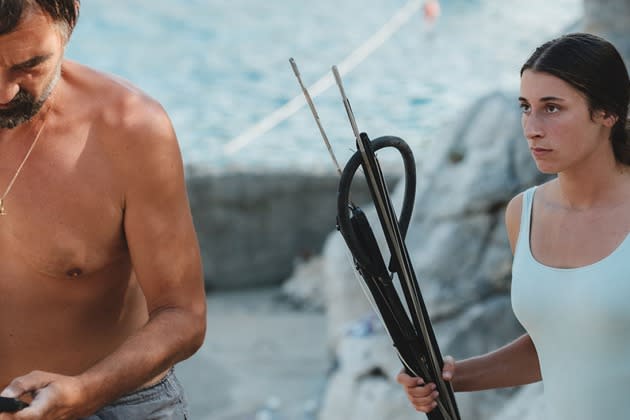‘Murina’: Film Review

As the stunning Murina opens, a blue expanse of water fills the frame like a painterly abstraction. Two divers drift into view, otherworldly in their masks and flippers and seemingly united in their spear-fishing mission. Once they’re back in the sunlight, though, their moray-eel prey dying in a pail between them on the boat, the man and his 17-year-old daughter are not in harmony. They might even be mortal enemies.
With an exceptional quartet of lead actors and a potent immersion in the Croatian island locale — you can practically smell the salt air and sea — Murina draws the viewer straight into its emotional undertow. Director Antoneta Alamat Kusijanovic and her co-writer, Frank Graziano, have constructed a taut story bristling with unease, and one that looks head-on at conflict. The father-daughter power struggle between Ante (Leon Lučev) and Julija (Gracija Filipović) is right on the surface from the get-go.
More from The Hollywood Reporter
L.Q. Jones, 'Wild Bunch' Actor and Member of Peckinpah's Posse, Dies at 94
Martin Scorsese Expresses Regret Over Not Working With Ray Liotta Again After 'Goodfellas'
Those tensions are heightened when Ante readies for the arrival of “God on Earth,” as he refers to Javier (Cliff Curtis), the old friend and former employer he hopes will buy his land in order to build a resort. There’s a desperate edge to his preparations for a dinner to welcome the business magnate, and Julija seethes at Ante’s every barked command. Her onetime beauty-queen mother, Nela (Danica Čurčić), who beneath her serene veneer trembles with girlish excitement over the upcoming festivities, advises patience. “We’ll be able to move to Zagreb,” Nela tells her daughter, holding out the promise of a big-city escape from their isolation. The windfall of a deal with Javier, she believes, will calm Ante; Julija sees only the certainty that his monstrousness will grow.
As smooth and low-key as Ante is frantic and grandiose, Javier arrives on a launch from his supersized yacht with a sprawling entourage. The dashing subject of magazine covers (“The Ruthless Icon,” one headline blares), he carries himself with the worldly, subdued confidence of a true alpha, but isn’t above a passive-aggressive dig or two to put Ante in his place. The ambivalent nature of the two men’s friendship is complicated by the onetime romantic connection between Javier and Nela, a spark that Julija encourages even as she flirts with him herself.
In different ways, Javier becomes a figure of potential rescue for Julija as well as Ante. With his encouraging talk of Harvard and life beyond the island, he begins to look like a savior to the inexperienced teen. A brief scene in which the visiting tycoon and the young woman walk across a rocky stretch of island recalls Antonioni’s L’Avventura. It’s a flickering allusion, but an affecting one. Kusijanovic has made a film of plain-spoken poetry, rooted in the physical world rather than in a free-floating mood of existential despair, but the cinematic reference underscores the feeling of looming disaster in Murina, just as the judiciously used music by Evgueni and Sacha Galperine pulses with foreboding as well as a sense of mystery and wonder in the watery depths.
The water is Julija’s element, and she moves between land and sea so frequently that she’s often clad in just a bathing suit — “naked,” according to a couple of judgmental adults clinging to old-school notions. Watching the revelers, a few years her senior, on a yacht docked nearby, Julija sees the promise of freedom and sex, prospects that grow especially charged as her story becomes one of an imprisoned princess in a remote stone house.
Kusijanovic’s lifelong familiarity with the Croatian island setting informs every aspect of the film, as do Filipović’s abilities as a professional swimmer, particularly in the movie’s gut-churning climax and a scene that extends beyond the closing credits. Capturing the sea’s sensuousness and danger, the land’s desolation, and the characters’ intense interplay, the camerawork is astute. Zoran Mikinčić-Budin handles the underwater cinematography, while ace DP Hélène Louvart adds another indelible story about female experience to her credits, after such recent gems as The Lost Daughter, Never Rarely Sometimes Always and Invisible Life.
Murina is a notable debut for a gifted director, its profile enhanced by the involvement of Martin Scorsese as an executive producer and the Camera d’Or trophy for best first feature at Cannes in 2021. The straightforward dialogue is a key strength of Kusijanović and Frank Graziano’s screenplay. In a story this well told and acted, there’s tremendous power when people say what they mean.
The pointed comment of a minor character near the beginning of the film might, in lesser hands, lie flat: an obvious statement of theme. But here it’s alive with the untold stories of generations of women, and a tantalizing hint of the struggles to come in Julija’s clash with Ante. As they prepare for the big dinner to welcome Javier, the older housekeeper who cleans the speared murina (moray eel) says, “Look how she bit her own flesh to set herself free.” Freedom has its price in this riveting drama, but as the characters fixate on life-changing what-ifs, troubled waters make way for astounding realities.
Best of The Hollywood Reporter

